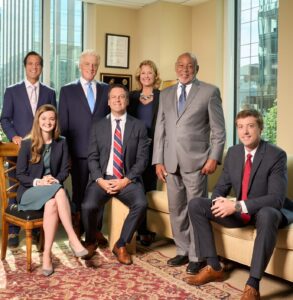Virginia is an at-fault state, which means the driver who caused the car crash bears the financial responsibility for compensating the injured party. This differs from a no-fault system, in which car accident victims file claims with their insurance company, regardless of who was at fault for the accident.
If you were injured in a car accident and are wondering how Virginia’s at-fault system will affect your claim, call the Regan Zambri Long, Virginia, car accident lawyers. We will answer your questions and pursue compensation for your medical expenses and lost income.
Contact Us Today to Schedule
a Free Consultation
Filing a car accident claim in an at-fault state can be tricky. To help you better understand your claim, we’ll break down Virginia’s insurance requirements and your options for recovering compensation after an accident.
Currently, Virginia’s minimum requirements for car insurance are:
Those minimum requirements will increase to $50,000/$100,000/$25,000 on January 1, 2025.
Now that we know the state requirements let’s look into Virginia’s Uninsured Motor Vehicle Fee. This is a $500 fee drivers can pay if they do not wish to carry liability insurance. You read that correctly – Virginia legally permits motorists to drive without car insurance. While this can leave the person who suffered injuries scrambling for compensation, there are options for financial recovery:
The Regan Zambri Long car accident attorneys take a comprehensive approach, considering your insurance coverage, the coverage of the at-fault driver, and all available legal options to ensure you receive the settlement you deserve.
The principle of pure contributory negligence is practiced in only a handful of jurisdictions across the United States, including Virginia. In an at-fault state, this legal principle plays a huge role in personal injury cases, so it’s important to understand how it works.
Pure contributory negligence states that if the accident victim is even slightly responsible for the accident and the injuries caused, he or she is barred from recovering damages. It doesn’t matter if the other driver is more at fault—if you share some blame, you cannot collect compensation.
For example, let’s say your car accident resulted in serious injuries. The other driver ran a stop sign, t-boned your car, and caused several broken bones that required surgery. However, during the investigations, it was discovered that you were also speeding during the accident. The defense attorney will argue that your negligence contributed to the accident and, therefore, you should not be able to recover damages.
Of course, defense attorneys quickly invoke the contributory negligence rule to get their clients off the hook easily. Your attorney will need to build a rock-solid case proving you were not at fault for the accident.
A car accident report is vital for a successful claim for three reasons:
Car accident claims in Virginia rely on the legal concept of negligence, which rests on four pillars: duty of care, breach of duty, causation, and damages. To establish complete liability, you must demonstrate how the driver’s behavior satisfied each of these elements:
Proving the other driver’s complete liability requires a thorough investigation. The Regan Zambri Long law firm will utilize the police report and witness statements to investigate your accident independently.
We will partner with medical consultants, pour over traffic camera footage, and hire an accident reconstruction expert to analyze the crash. We will explore cell phone records to investigate distracted driving or even blood tests to demonstrate driving under the influence.
Building a strong case with this evidence significantly increases your chances of proving the other driver’s complete liability in the crash and maximizing your settlement.
You can recover three damages from a car accident claim: economic, non-economic, and punitive.
 What if the Accident Was Partly My Fault?
What if the Accident Was Partly My Fault?In a pure contributory negligence state, a partially your-fault accident makes it difficult to recover compensation. This is where you will need an experienced personal injury lawyer who will help maximize your damages. Speak to a Regan Zambri Long car accident lawyer who will work to build a compelling argument in your favor, proving you were not responsible in any way for the accident.
You don’t have to navigate Virginia’s at-fault, pure contributory negligence system alone. Regan Zambri Long’s top Virginia car accident lawyers offer a free consultation to discuss your case and explore your options. Contact us today, and let us help you get back on your feet.